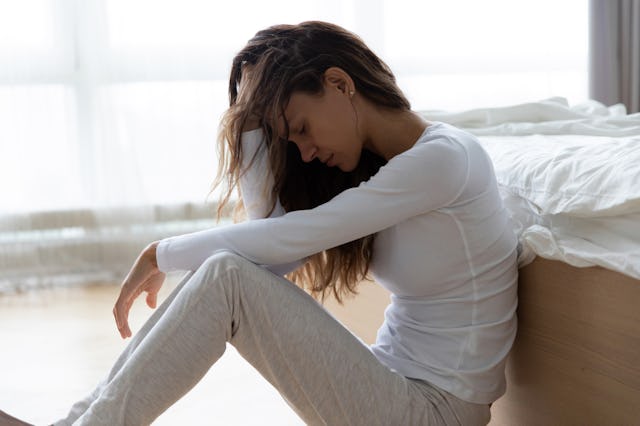Perimenopause? Thyroid Issues? Your Problem Might Actually Be Low Estrogen
Symptoms of low estrogen vary, but many are mistaken for something else.

Do you often find yourself waking up to damp sheets (and not because your little one snuck in and accidentally wet the bed)? Is your skin drier than usual? Do your breasts feel tender? Are hot flashes becoming a daily occurrence for you? While your first instinct might be to type “perimenopause symptoms” into Google, low estrogen could actually be to blame.
Estrogen is a hormone responsible for the development and maturation of the reproductive system. It’s also a sex hormone, which means it helps you produce natural lubrication and influences your sex drive. It’s normal for a person’s estrogen levels to yo-yo during the menstrual cycle. At a certain point, however, your estrogen levels could fall too low and begin to affect your daily routine physically and mentally. This can happen in your 20s, 30s, 40s, or as you near or enter menopause. In fact, vaginal dryness and painful sex can occur due to menopause and low estrogen.
Menopause, low estrogen, and thyroid disease all share similar symptoms. Oh, what joy! Accordingly, it’s essential to brush up on what exactly the medical term “low estrogen” means. This helpful and expert-sourced low estrogen guide covers all the bases, from causes and weird symptoms to management and treatment advice.
Why is estrogen important anyway?
In your however-many-years of life, you’ve probably heard your doctor reference your estrogen levels once or twice mid-appointment. And sure, you know that the hormone is important (it can increase your sex drive, people!), but estrogen plays a more significant role than you may realize in the development and maturation of your body.
According to Dr. Ruth Arumala, DO, MPH, FACOG, a board-certified ob-gyn in Washington, estrogen provides key signals that prompt breast development, maintenance of the vagina, changes to the endometrium during your menstrual cycle, and maturation of ovarian follicles to prepare for ovulation. Estrogen can also maintain bone mineral density, improve brain health and cognitive function, and help stabilize your mood.
What causes low estrogen?
Low estrogen can affect anyone, no matter their age, body type, or lifestyle. However, things like excessive exercise, eating disorders, autoimmune diseases, and severely low body fat can trigger low estrogen. Low estrogen is also commonly caused by ovary-related reasons. This makes sense, as ovaries are responsible for producing most of your body’s estrogen, per John Hopkins Medicine. “Clinically, low estrogen can be attributed to menopause and ovaries damaged or removed by surgery, radiation, or chemotherapy,” Arumala explains. “Premature ovarian insufficiency can also cause low estrogen, and this happens when women hit menopause before the age of 40.”
Other factors include low-functioning or underactive pituitary glands, which is responsible for releasing hormones. Turner syndrome can also impact estrogen levels along with chronic kidney disease. Your kidneys help produce hormones, and it could lead to low estrogen levels when they're not functioning at full capacity.
What are the symptoms of low estrogen?
Similar to PMS symptoms and signs of menopause, symptoms of low estrogen can vary based on the person. According to Arumala, some of the most common symptoms of low estrogen include:
- You experience hot flashes.
- Your period is irregular or absent, and you’re not on birth control.
- Your breasts feel tender.
- You have dry skin.
- You’re sweating during the night.
- You experience weight gain, specifically in the belly region.
- Your hair becomes brittle.
- You have foggy thoughts.
- Sexual intercourse becomes painful.
- Your vagina is dry (or not producing enough natural lubrication during sex).
- You have insomnia.
- You have difficulty concentrating.
- You’re chronically fatigued.
- Your bones are weak (osteoporosis).
What makes these symptoms seem “weird”? Well, as you can see, many of them you probably wouldn’t think to attribute to low estrogen. In fact, you’d more likely than not assume they were the result of some other sort of imbalance or issue.
Granted, this isn’t an exhaustive list, so please speak with your ob-gyn about any low estrogen concerns you may have.
How is low estrogen diagnosed?
If you find yourself checking symptoms off that list and your period is irregular or absent, it’s time to schedule a visit with your doctor. There’s no reason to stress yet since low estrogen levels are super-common and treatable, but your doctor will need to order lab tests to rule out any other possible causes like thyroid disease. “Your physician will order labs that test for a few hormones, including thyroid-stimulating hormone, follicle-stimulating hormone, estradiol, free and total testosterone, and prolactin. They may also check a complete blood count, B12, and folate to rule out several types of anemia,” Arumala explains.
How is low estrogen treated?
In addition to managing your stress levels (easier said than done, obviously) and maintaining a well-balanced diet (carbs are your friend, not the enemy), low estrogen can be treated with estradiol. It can be given orally like birth control, transdermally via a patch, or vaginally. Albeit, Arumala states that people with uteruses must also be given progesterone “to counteract the effects of estrogen on the lining of the uterus.” As always, contact your doctor with any questions or concerns you may have.
Expert Sources:
Dr. Ruth Arumala, DO, MPH, FACOG, a board-certified ob-gyn in Washington
This article was originally published on